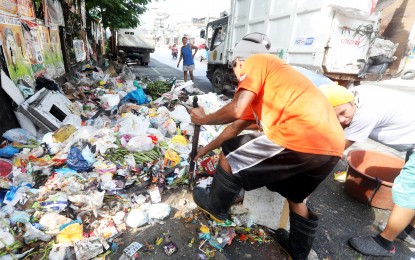
UNSEGREGATED. Garbage collectors have to use shovels and plastic boxes to collect unsegregated trash along Zapote Road near Caloocan City Hall Extension on May 24, 2022. Environment Acting Secretary Jim Sampulna on Monday (May 30) said solid waste management remains a major problem for the Philippines mostly due to the mismanagement of waste segregation at the local level. (PNA photo by Oliver Marquez)
MANILA – Department of Environment and Natural Resources (DENR) Acting Secretary Jim Sampulna said solid waste management remains a major problem for the Philippines mostly due to the mismanagement of waste segregation at the local level.
He said despite the enactment of Republic Act (RA) 9003 or the Ecological Solid Waste Management of 2000 that mandates segregation at the barangay level, some local government units (LGUs) have yet to strictly enforce the law.
“The national government can only do so much. While we provide the technical assistance, capability support, and information dissemination on environmental laws, the responsibility of solid waste management rests with the LGUs,” Sampulna said in a news release on Monday.
“The LGUs need to strictly enforce their solid waste management plan, allot a sufficient budget for the implementation, and impose proper segregation in their contracts between their waste collection service providers,” he added.
As the DENR has closed all 335 open dumpsites in the country, it has required LGUs to establish a sanitary landfill to replace the garbage dumps.
Meanwhile, DENR Undersecretary for Solid Waste Management and Local Government Units Concerns and Attached Agencies Benito Antonio de Leon said there remains a lack of understanding of the importance of waste segregation among households, thereby no lifestyle changes towards disposal.
“Although there is a significant observation on the compliance among households in some areas, there are others who still don’t segregate. We need to remind ourselves that our neglect of waste segregation leads to environmental impacts such as harm to our marine life,” de Leon said.
“Instead of specific trash ending up in materials recovery facilities, composting sites, and hazardous waste treatment plants, it ends up piling in our scarce sanitary landfills and water bodies, causing diseases, pollution, drainage obstructions, food contamination, among many others,” he added.
De Leon reminded the public to observe proper segregation in their homes, specifically on compostable, recyclable, residual, household hazardous, and household healthcare wastes.
Compostable and biodegradable wastes such as plants, wet paper, and food waste are placed in green trash bins, while recyclable wastes such as glass, plastic bottles, and scrap metal are placed in the blue trash bins.
Meanwhile, black trash bins represent residual wastes such as used plastic or paper cups, food wrappers and tetra packs, and red trash bins represent household hazardous wastes such as paint cans, spray canisters, and electrical or electronic equipment.
Used face masks, gloves, and other Covid-related wastes belong to the household healthcare wastes which are placed in yellow trash bins.
De Leon said in the absence of color-coded bins or trash bags, households can alternatively label it according to its category.
To teach waste management at an early age, he invited children aged 5 to 8 years old to download DENR’s Basura Buster app on their mobile phones and learn about proper waste segregation in an enjoyable way. (PR)
